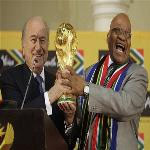
"The 2010 FIFA World Cup will be organized in South Africa." Six years ago, South Africa won its bid to become the first African nation to host a football World Cup.
The country's first post-apartheid president, Nelson Mandela, campaigned hard for the prestigious tournament because he saw it as a way to further reconciliation after decades of racial separation and conflict.
Danny Jordaan is the head of the South African Organizing Committee: "After 1990, when Nelson Mandela walked out of that prison, we saw it as a beginning of the creation of a new South Africa. After the elections of 1994, we then had to deal with building a new democratic, non-sexist South Africa."
South African officials met during the 1994 World Cup in the United States and decided to bid on hosting the next available World Cup, in 2006.
South Africa lost this first bid to Germany by one vote, but Jordaan says that only strengthened the team's resolve.
"It is been a tough journey, first, just to convince people that we should be regarded as serious candidates. It is only after, and ironically, when we lost to Germany 12 to 11 [votes], that the world started sitting back and saying, 'South Africa is a worthy cause,'" Jordaan said.
The South African government launched a massive effort to build the infrastructure needed for the World Cup, investing billions of dollars in stadiums, transportation hubs, security and communications.
But along the way Jordaan and Sepp Blatter, the head of the football's governing body FIFA, constantly reassured the doubters of South Africa's ability to host the tournament even though it was as late as the team draw in Cape Town six months ago.
"You are ready. I am ready. Africa is ready. South Africa is ready," Blatter said.
But Jordaan says the effort has been worth it, especially given the country's history of division and conflicts.
"This World Cup is beginning to plant the seeds, serving as a glue to bind the nation. And nation building, social cohesion, is an important outcome for us in this World Cup. And we are quite happy with what we have seen thus far."
The World Cup will also leave a legacy of new infrastructure to buoy economic expansion in the future, and leaves a sense of accomplishment among a people who never faltered in their belief that Africa deserved a place on the world stage.
Special: World Cup Preview 特辑:世界杯预览
South Africa police train to face World Cup emergencies
(来源:VOA 编辑:陈丹妮)
